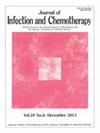Optimizing cytomegalovirus treatment through therapeutic drug monitoring in a ganciclovir-unresponsive lung transplant recipient
IF 1.5
4区 医学
Q3 INFECTIOUS DISEASES
引用次数: 0
Abstract
Ganciclovir and valganciclovir are utilized in the treatment of cytomegalovirus infection and its reactivation following lung transplantation. However, treatment complexity arises due to the development of resistant viruses. Recently, therapeutic drug monitoring of ganciclovir has been studied to enhance dosing strategies for both ganciclovir and valganciclovir. We present a case of a lung transplant recipient who developed cytomegalovirus infection and diarrhea despite valganciclovir prophylaxis. Therapeutic drug monitoring confirmed that the area under the curve of ganciclovir was 67.0 μg h/mL, indicating adequate drug absorption. Although genotypic sequencing tests for antiviral resistance to cytomegalovirus were unavailable at our institution, our therapeutic drug monitoring findings raised suspicion of ganciclovir resistance in the cytomegalovirus. Therefore, the antiviral regimen was modified to foscarnet, leading to prompt cytomegalovirus clearance. Subsequently, foscarnet was replaced with letermovir for secondary prophylaxis. Throughout the treatment, tests for cytomegalovirus DNA and pp65 antigens consistently yielded negative results. This case underscores the value of therapeutic drug monitoring in suspecting potential ganciclovir resistance.
通过更昔洛韦无反应肺移植受者的治疗药物监测优化巨细胞病毒治疗
更昔洛韦和缬更昔洛韦用于治疗巨细胞病毒感染及其肺移植后的再激活。然而,由于耐药病毒的发展,治疗变得复杂。最近,更昔洛韦的治疗药物监测已被研究,以加强更昔洛韦和缬更昔洛韦的给药策略。我们提出一个病例的肺移植受者谁发展巨细胞病毒感染和腹泻,尽管缬更昔洛韦预防。治疗药物监测证实更昔洛韦曲线下面积为67.0 μ h/mL,说明药物吸收充分。虽然我们的机构无法获得巨细胞病毒抗病毒药物耐药性的基因型测序试验,但我们的治疗药物监测结果提出了巨细胞病毒对更昔洛韦耐药的怀疑。因此,抗病毒方案被修改为膦酸钠,导致巨细胞病毒迅速清除。随后,用利特莫韦代替氟膦酸钠进行二级预防。在整个治疗过程中,巨细胞病毒DNA和pp65抗原检测始终呈阴性结果。该病例强调了在怀疑潜在的更昔洛韦耐药性时进行治疗药物监测的价值。
本文章由计算机程序翻译,如有差异,请以英文原文为准。
求助全文
约1分钟内获得全文
求助全文
来源期刊

Journal of Infection and Chemotherapy
INFECTIOUS DISEASES-PHARMACOLOGY & PHARMACY
CiteScore
4.10
自引率
4.50%
发文量
303
审稿时长
47 days
期刊介绍:
The Journal of Infection and Chemotherapy (JIC) — official journal of the Japanese Society of Chemotherapy and The Japanese Association for Infectious Diseases — welcomes original papers, laboratory or clinical, as well as case reports, notes, committee reports, surveillance and guidelines from all parts of the world on all aspects of chemotherapy, covering the pathogenesis, diagnosis, treatment, and control of infection, including treatment with anticancer drugs. Experimental studies on animal models and pharmacokinetics, and reports on epidemiology and clinical trials are particularly welcome.
 求助内容:
求助内容: 应助结果提醒方式:
应助结果提醒方式:


